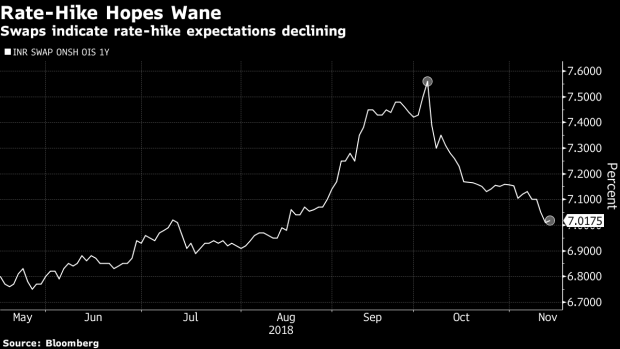Nov 16, 2018
Bond Bulls Breathe Easy as India Rate-Hike Bets Fade on Oil Drop
, Bloomberg News

(Bloomberg) -- Investors are boosting bets that India’s central bank may break from its peers in Asia and stay on hold as retreating oil prices ease concerns about inflation and the health of Asia’s third-biggest economy.
The cost to lock in borrowing rates for a year has declined from a more than a three-year year high reached early October to 7.01 percent on Wednesday, the least since mid-August, interest-rate swaps show.
The decline signals weakening expectations of rate increases by the Reserve Bank of India as the country’s retail inflation in October eased to a 13-month low and oil -- India’s top import -- slumped into a bear market.
“With oil prices taking a turn even the swap market has taken a U-turn on its rate-hike expectations,” said Vivek Rajpal, a rates strategist at Nomura Holdings Inc. in Singapore. “The market is indicating that the RBI will stay on hold in the upcoming meetings.”
The RBI in October held borrowing costs after back-to-back hikes since June, and is due to review policy next month. That stance placed the authority behind its Asian peers, who have been raising rates to defend their currencies. Bank Indonesia unexpectedly raised seven-day reverse repurchase rate by 25 basis points this week, while the Philippine central bank hiked its benchmark rate for a fifth straight meeting to curb inflation.
The slide in oil prices has also helped the rupee, with Asia’s worst-performing currency this year poised for its first monthly gain since January, and the benchmark 10-year bonds are on course for their first quarterly advance in more than a year.
If Brent crude remains below $70 per barrel, a rate cut by February or April 2019 can’t be ruled out, according to Bloomberg Economics. The contract for January delivery has dropped $3.13, or 4.5 percent, this week.
To contact the reporter on this story: Kartik Goyal in Mumbai at kgoyal@bloomberg.net
To contact the editors responsible for this story: Tan Hwee Ann at hatan@bloomberg.net, Ravil Shirodkar
©2018 Bloomberg L.P.


